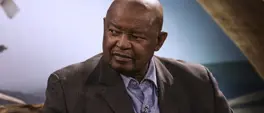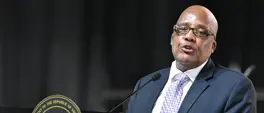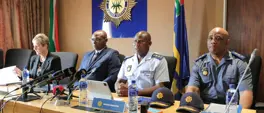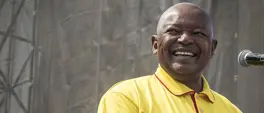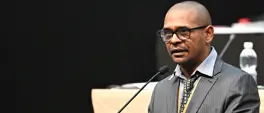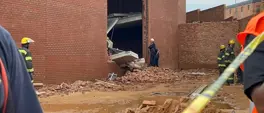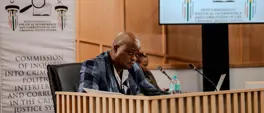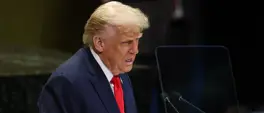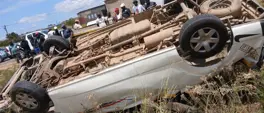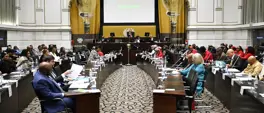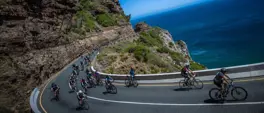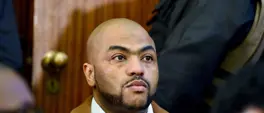CHARLES MATSEKE | Delays and doubts cast shadow over the Madlanga commission of inquiry
Charles Matseke
28 August 2025 | 11:57"The state is stretched thin, unprepared for the concentrated counter-attack of organised crime."
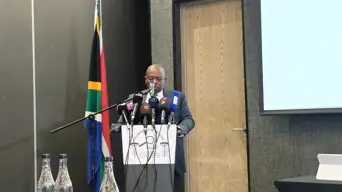
There is a familiar ritual in South African politics. A crisis unfolds, the public outcry mounts, and government responds with the grand announcement of a commission of inquiry. It is often sold as the silver bullet, the panacea for a system in decay.
Yet, often, these commissions die a slow bureaucratic death, delayed, defunded, or deliberately obstructed. The Madlanga Commission, designed to confront the deepest rot within our law enforcement and intelligence structures, has suffered the same fate. It is, by all practical measures, Dead on Arrival (DOA).
On paper, the Madlanga Commission was to begin hearings on 1 September 2025, with the promise of peeling back the layers of political interference, cartel infiltration, and the collapse of public trust in the police. Instead, what the nation received was another postponement, indefinite this time justified under the thin veil of “procurement challenges.”
The Department of Justice cited failures to secure basic ICT and venue infrastructure.
The Deputy Director-General for ICT, Jabu Hlatshwayo, has been suspended and disciplinary action hangs over the head of the Department’s Director-General, Doc Mashabane.
Minister of Justice Thembi Kubayi claims corrective measures are underway, but the public sees what this really is: an inquiry kicked into the long grass, where accountability goes to die.
In The 48 Laws of Power, Robert Greene warns: “Plan all the way to the end” (Law 29). The architects of this commission did the opposite. They built castles in the air, grand designs with no foundation, an inquiry announced before the necessary machinery was secured. But is this just incompetence? Or is it the more insidious phenomenon of intentional incompetence, bureaucratic stalling designed to protect the politically connected?
The EFF has accused President Cyril Ramaphosa of weaponising the Madlanga Commission as a PR exercise, a gesture to pacify public anger without ever intending to allow it to run its course.
In that reading, the procurement delay is not an accident but a tactic. It shields the embattled Police Minister Senzo Mchunu, currently on special leave, from imminent exposure. It diffuses pressure on a ruling party already crumbling under factionalism.
Sun Tzu, in The Art of War, counsels: “Appear weak when you are strong, and strong when you are weak.” This government presents itself as weak and overwhelmed, yet behind that façade lies the strength of deliberate sabotage. A political elite who understand that endless delay is its own form of victory.
Unlike the Zondo Commission, which interrogated state capture largely through paper trails and financial records, the Madlanga Commission touches on a far more dangerous terrain: cartel penetration into the heart of the state. Witnesses here will not merely be exposing corrupt contracts; they will be naming individuals tied to violent syndicates, with global reach and deep pockets.
Already, names like KT Molefe, a South African with a reputation as an international organised crime figure linked to networks in Europe, Asia, and South America, have surfaced. Molefe’s alleged dealings suggest that the cartel is not waiting passively for revelations; it is active, anticipatory, and prepared to retaliate.
The question then: how does the commission protect whistleblowers when the same SAPS and intelligence agencies charged with their protection are themselves compromised? The Art of War reminds us: “He who defends everywhere defends nowhere.”
The state is stretched thin, unprepared for the concentrated counter-attack of organised crime.
South Africa’s Witness Protection Act of 1998 exists on paper, but resources, capacity, and political will are another matter entirely. Without a fortified witness protection programme, this commission risks becoming a death trap for those brave enough to testify.
History offers models that are both cautionary and instructive.
• Italy’s Maxi Trial (1986–1992): Nearly 500 Mafia members were prosecuted, thanks to testimony from defectors under ironclad witness protection. The Italian state introduced laws that treated mafia association as a crime and empowered the seizure of criminal assets. Crucially, the judiciary stood firm.
• Mexico’s Cartel Wars: Repeated attempts to reform the police and judiciary failed because cartels had already infiltrated every level. Entire police units had to be dissolved and rebuilt. Even with U.S. support through the Mérida Initiative, corruption persisted.
• United States’ RICO Act (1970): Allowed prosecutors to targetentire criminal enterprises, not just individuals, crippling syndicates by dismantling their networks rather than chasing lone wolves.
South Africa must decide which path to follow. Do we want the steel-spined resolve of Italy, the endless cycle of collapse and reconstitution like Mexico, or the legal ingenuity of RICO? At present, we seem closer to Mexico’s failures than to Italy’s victories.
The rot does not stop at SAPS. Revelations by former acting police commissioner Nhlanhla Mkhwanazi painted a chilling picture of judges, magistrates, and prosecutors entangled in cartel influence.
If that is true, the Madlanga Commission faces an impossible paradox: how can a judiciary tainted by organised crime preside over justice againstit?
Here, too, the suspension of senior Justice Department officials may be less about accountability and more about controlling public perception. A sacrificial offering to signal action, while shielding the true architects of corruption.
All of this unfolds on the cusp of 2026, a year heavy with symbolism and danger. The anniversaries of 1976 and of the democratic transition in 1996 demand introspection. The TRC-style commissions promised for 2026 will overlap with the stuttering Madlanga process.
And within the ANC itself, the twin threats of Senzo Mchunu and Shadrack Sibiya have fractured the party’s cohesion.
Could the ANC implode under the weight of cartel exposure and factional battles? Could the state itself enter a phase of self-destruction? These are not rhetorical questions, they are live, urgent, national security risks
In the end, the Madlanga Commission may stand as another monument to South Africa’ culture of inquiry without consequence.
“Never go past the mark you aimed for,” Greene reminds us (Law 30). Yet here we have a commission that never even reached the starting line.
The public is told to wait. The political elite breathes easier. The cartels watch and prepare. And witnesses remain unprotected, silenced by fear.
As I wrote in a previous op-ed: “Commissions have become like national holidays for the political elite: long, ceremonial, and designed to postpone any real work.”That remains as true today as ever.
The Madlanga Commission is dead on arrival. The only question left is whether South Africa’s democracy will be buried alongside it.
Charles Matseke (MPhil in Politics and International Relations) is a researcher and writer with a keen interest in contemporary political dynamics. His research focuses on electoral politics, foreign policy analysis, and international relations, with a particular emphasis on the Global South and Africa's role in global affairs.
Get the whole picture 💡
Take a look at the topic timeline for all related articles.
Trending News
More in Opinion
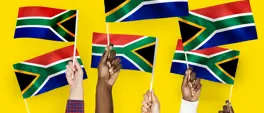
3 March 2026 11:40
Who belongs in South Africa? UCT philosopher weighs in on identity and ownership
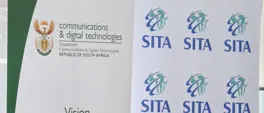
2 March 2026 11:05
TLALI TLALI |Mandate, money and accountability - What the government website debate really reveals

27 February 2026 11:00
JAMIL F. KHAN | Human rights last on the list for global leadership agenda
